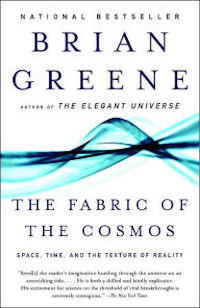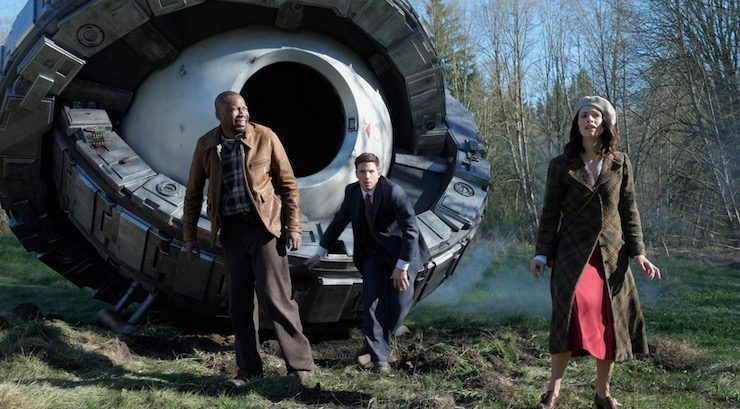I’ll admit that I didn’t expect much when I started watching the first half of the season of Timeless. The promos, with their swelling music, seemed a bit hokey and overly dramatic, and I wasn’t sold on the time travel premise. But then I actually sat down with the show, and found that not only was it enjoyable, but that I genuinely liked it. The leads are compelling, the mystery is intriguing, and it doesn’t take itself too seriously. Long story short, if you haven’t given this show a chance but you like fun, give it a try.
The scientific explanation of time travel in the show gets one sentence from character Connor Mason: “If you get a powerful enough gravitational field, you can actually bend space-time back on itself in a kind of loop, a closed time-like curve that would allow you to cross over to an earlier point.” There are certain rules within the show: only travel to the past is allowed, and only to periods before the time travelers’ births. And the characters have the ability to change the past, but they shouldn’t. That’s what main character and historian Lucy Preston is there to ensure.
The beauty of this show is in its simplicity: the creators and writers simply aren’t interested in digging too deep into the science because, at its core, it’s an adventure show. But I’m here to ruin the fun by asking: Is the time travel in Timeless actually possible?
Let’s rewind and pose a simpler question: Is time travel possible? We turn to Brian Greene’s The Fabric of the Cosmos: Space, Time, and the Texture of Reality, which breaks the stuff of our universe down to its most basic questions: What is space? What is time?
To understand whether time travel is possible, we need to understand the nature of time itself. Experience, and what we see in the world, tells us that time has different characteristics (the past is different than the future, because the past has already happened and the future has not), and that time is like an arrow: it moves in one direction. However, that is biased by our own perceptions and worldview; Einstein’s theory of relativity tells us that every moment is the same. Time does not flow. There is no past, present, and future. There just is. Just because we perceive time a certain way doesn’t mean it actually is that way.
Quantum mechanics adds some layers and complications to this, but let’s leave that for now. If time just is, then can we move backward and forward through it? Is time travel even possible?
Most scientists would agree that no, you cannot travel in time. But, technically, physics doesn’t say it’s a no go. There’s nothing that we’ve discovered that tells us time travel is strictly impossible. The question really isn’t whether it’s possible: it’s what you can do with it.
The premise of Timeless is that a man named Garcia Flynn (played oh so well by ER’s Goran Višnjić) has stolen a time ship and is traveling to pivotal points in American history to change the outcome. Our intrepid team is tasked with stopping him, and while they succeed for the most part, they’re not always entirely successful. This means they sometimes come back to a changed present, where only those within the time ships (Flynn and his team, and Lucy and hers) can remember events as they were. In other words, they are changing past events. Changing the timeline.
Traditional physics tells us that this is, quite simply, impossible. Every moment happened as it happened. Every moment will happen as it will happen. There is no concept of human free will factored in; it is how it is and will be how it will be (except time is relative, and past, present, and future are subjective, so technically it just is how it is. There’s no “will be” in relativistic physics.) If you travel back in time and are present at certain events, you were always there. That event never unfolded in a way in which you weren’t there. There are no paradoxes; you can’t travel back in time and murder your own grandfather, unless in your memory, your grandfather was murdered by someone who looked a lot like you do. Period. End of story.
 Quantum mechanics, however, tells us something different: as a science fiction fan, you’re probably familiar with the Many Worlds theory (even if you don’t know it by that name). The bottom line is that every potential outcome of any situation—every single one—actually occurs in a parallel universe. So while the events in the timeline of your universe are static, you have the ability to change the events in the past, but you do so not just by traveling in time. According to this theory, the characters in Timeless are actually jumping to alternate parallel universes.
Quantum mechanics, however, tells us something different: as a science fiction fan, you’re probably familiar with the Many Worlds theory (even if you don’t know it by that name). The bottom line is that every potential outcome of any situation—every single one—actually occurs in a parallel universe. So while the events in the timeline of your universe are static, you have the ability to change the events in the past, but you do so not just by traveling in time. According to this theory, the characters in Timeless are actually jumping to alternate parallel universes.
While I highly doubt that the creators of Timeless are going to rename the show Alternate Parallel Universe-less, it’s a fun possibility to think about. We don’t know that time travel is an impossibility when it comes to physics, nor do we know the rules that would govern such an endeavor. If you’re interested in learning more about the nature of time, space, and our reality, Brian Greene’s The Fabric of the Cosmos is an excellent place to start.
Swapna Krishna is a freelance writer, editor, and giant space and sci-fi geek. You can find her on Twitter at @skrishna.










